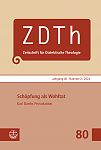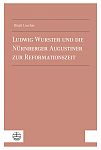Perceptions and Realities
Arbeiten zur Kirchen- und Theologiegeschichte (AKThG), Band 28
Pauline Allen, Wendy Mayer, Bronwen Neil (Hrsg.)
In 2002 the influential scholar of Late Antiquity, Peter Brown, published a series of lectures as a monograph titled Poverty and Leadership in the Later Roman Empire. Brown set out to explain a trend in the late Roman world observed in the 1970s by French social and economic historians, especially Paul Veyne and Evelyn Patlagean, namely that prior to the fourth century and the rise in dominance of Christianity, the poor in society went unrecognized as an economic category. This corresponded with the Greco-Roman understanding of patronage, whereby the state and private donors concentrated their largesse upon the citizen body. Non-citizens, for instance, were excluded from the dole system, in which grain was distributed to citizens of a city regardless of their economic status. By the end of the sixth century, rich and poor were not only recognized economic categories, but the largesse of private citizens was now focused on the poor. Brown proposed that the Christian bishop lay ...






